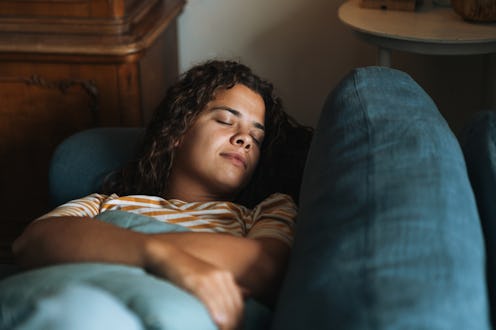
Happy National Napping Day, everyone! I think National Napping Day is officially my new favorite holiday. As someone who typically operates on very little sleep, I particularly dread Daylight Savings Time and losing that precious, precious hour of sleep. While it's possible to get through the day without sleep, I think taking naps is a more enjoyable approach. If you time it right, you can take a nap and still accomplish your tasks for the day.
Everyone reacts to lack of sleep differently, but for many of us (myself included) lack of sleep can lead to mental and physical health problems, such as headaches, difficulty concentrating, blurry vision, increased hunger, and irritability. And sure, if you can power through the entire day and make sure you get a great night's sleep afterwards, there's nothing wrong with that. But if taking an afternoon nap alleviates the symptoms of lack of sleep, I think it's definitely worth a shot.
As far as I know, naps aren't super popular in the United States (outside of elementary school classrooms, at least) but that isn't the case everywhere: In Spain, for instance, it's the norm to take a 15 to 30 minute nap during the day. Luckily, the research shows that napping is generally a good thing, so I'm hoping the napping craze picks up here in the United States, too. For now, here are five reasons you should take a nap, in honor of National Napping Day (which, let's be real, I'm hoping will eventually be every day):
1. Napping May Be More Effective Than Coffee
Personally, I'm a total caffeine addict. I love coffee at all hours of the day, especially on the days after I don't get enough sleep. However, some studies show that taking a midday nap is more effective at waking you up than drinking coffee. If you've already started brewing your coffee, however, some studies show that drinking a small amount of caffeine just before taking a short nap can make the experience more restful, as the nap occurs just before the caffeine actually kicks in. So when you wake up, you're reaping the benefits of the caffeine and the sleep.
2. Napping Helps You Retain Information
Let's be real: Most of the time when we're cutting back on sleep, it's because we're working on something important. For example, if you're cramming for a final exam at the end of the semester, you're likely to find yourself curled up in the library with a stack of flashcards and about a million highlighters. Now, if you stay up all night, it's likely your concentration is going down the tubes, as is your ability to keep your eyes open. Because no one wants to fall asleep during their final, it's important to plan smart when it comes to studying. For me, this usually means chugging coffee, but research shows that taking a nap can actually help you better retain information. Even a six minute nap can do the trick!
3. Napping Boosts Creativity
Studies show that short, well-timed naps can boost your creativity. Many argue that 90-minute naps are the best length to improve creativity and mental clarity. Creativity is (obviously) important if you work in the arts, but it's actually beneficial no matter what you spend your time pursuing: creative thought is linked with better leadership, better problem-solving, and better innovation. Even when it comes to relationships, creativity is important: Keeping your love-life full of surprises is never a bad thing, and having a sharper, more creative mind will help you keep your relationship fun, even on days you're pretty worn-out.
4. Napping Can Improve Mental Health
If I've learned anything as an adult, it's that when anyone (be it a partner, a friend, or a roommate) tells me that they need a nap, the only appropriate response is to let them. Seriously, you don't want to get in the way of someone who wants their sleep. Lack of sleep can lead to emotional instability, irritability, and impatience even in otherwise healthy people. Encouraging others to take a nap and revive their minds and bodies can work wonders for mood and happiness level; and the same goes for yourself, too! If you're feeling super cranky and you know you didn't get enough sleep the night before, there's no shame in taking a quick nap before you meet people for dinner or head to movie night.
5. Napping Can Decrease Your Risk of Heart Problems
Studies show that napping during the day is linked with better cardiovascular health. In fact, some studies show that people who regularly take naps during the day are, on average, 30 percent less likely to die of heart disease. 35 percent of the deaths of American women over the age of 20 are linked with cardiovascular issues. Worldwide, an average of 8.6 million women die from heart disease each year. In fact, many people consider heart disease to be the "silent killer" of women, as it's a heart issue often associated with men, not women. If napping can improve your mood and help your long-term heart health, I can't think of a better thing to do than get comfortable in your bed and take a snooze.
So, there you have it! There are plenty of science-backed reasons to take a nap, both in terms of your mental and physical health. In my opinion, the main reason I regularly nap is because it feels good: When I wake up after a nap, my eyes feel less sore, my brain feels more alert, and my body feels less aching and tension. Ideally, we'd all regularly get a solid night's sleep, but sometimes that just doesn't happen, and it's important to know the best approaches to napping on those days you just can't keep your eyes open.
Images: Galina Zhigalova/Moment/Getty Images; Giphy (5)